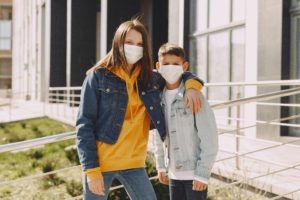COVID-19, School Closures, and Student Mental Health
by Aaron Leo
Students’ mental health was already being recognized as a growing concern in the United States before the COVID-19 pandemic which has wreaked social and economic havoc across the country and the world. Now experts are just beginning to explore the deleterious impacts that COVID-19 and the resulting school closures will have on students’ mental health.
The stress, uncertainty and social isolation brought about by the pandemic – as well as the trauma for those students who have lost friends and family to the disease – is sure to have effects on students’ mental health.
 Researchers have already uncovered some preliminary results about the impacts of the pandemic on the mental health of youth, and recent reports from around the world raise concerns. For instance, a survey of 2,111 youth in the U.K. reported that 83% of respondents said the pandemic had harmed their mental health. Similarly, a JAMA Pedriatics Report identifies a strong link between the pandemic-induced lockdown and increases in depression and anxiety among Chinese children. And out of 600 students surveyed by the ACLU of Southern California, over half of respondents said they were in need of mental health supports since school closures began. More research on this topic is sure to follow.
Researchers have already uncovered some preliminary results about the impacts of the pandemic on the mental health of youth, and recent reports from around the world raise concerns. For instance, a survey of 2,111 youth in the U.K. reported that 83% of respondents said the pandemic had harmed their mental health. Similarly, a JAMA Pedriatics Report identifies a strong link between the pandemic-induced lockdown and increases in depression and anxiety among Chinese children. And out of 600 students surveyed by the ACLU of Southern California, over half of respondents said they were in need of mental health supports since school closures began. More research on this topic is sure to follow.
The Gaps Left by School Closures
As a previous blog by Dr. Hal Lawson notes, schools provide a wide range of services to students including formal mental health counseling as well as the informal support of teachers and school leaders which many students rely upon. With schools around the world closing due to the pandemic, these needs are now falling to family members who may not be trained to provide these supports and already are likely to be coping with their own challenges wrought by COVID-19.
In addition, although educators are working hard to engage their students over remote mediums, students with special needs or those who receive additional services such as English language instruction are more at risk of falling behind their peers during school closures – a situation which can exacerbate underlying mental health issues. For example, a recent report by Lancet explains that students with autism may be harmed by the break in their routines and loss of one-on-one lessons that normally punctuate their school day.
And not to be taken for granted, school closures have also meant that students who relied on schools as oases from abusive family members at home now have no escape from these situations. As a Washington Post article explained, cases of child abuse have severely decreased during the pandemic likely due to a drop in mandatory reports made by school staff. In reality – and as corroborated by healthcare workers – the frequency and severity of child abuse are increasing across the nation as families are stuck at home quarantined together under stressful circumstances. Children may also be increasingly victims of neglect as the economic toll of the pandemic puts additional strains on already taxed working families throughout the country.
Moving Forward
 Although schools plan to reopen this fall, there are still serious questions about how the re-entry process can be done safely. Upon returning to school, educators and support staff at schools will not only have to cope with the mental health fallout of COVID-19 but must also address another concern: the harm of extended closures on student achievement gaps – what some have termed the “COVID-19 Slide.” An additional concern is the potential increase of drug abuse among youth who are seeking to cope with the stresses of the pandemic.
Although schools plan to reopen this fall, there are still serious questions about how the re-entry process can be done safely. Upon returning to school, educators and support staff at schools will not only have to cope with the mental health fallout of COVID-19 but must also address another concern: the harm of extended closures on student achievement gaps – what some have termed the “COVID-19 Slide.” An additional concern is the potential increase of drug abuse among youth who are seeking to cope with the stresses of the pandemic.
With these numerous challenges ahead, researchers and educators have already put forth a range of resources to help address the mental health needs of young people. Some examples include the National Center for School Mental Health and the Mental Health Technology Transfer Center.
See NYKids’ News and Resources pages for more information on how educators are adapting to the changes brought on by this pandemic and working to meet the urgent mental health needs of their students. We welcome your feedback and suggestions at nykids@albany.edu.
